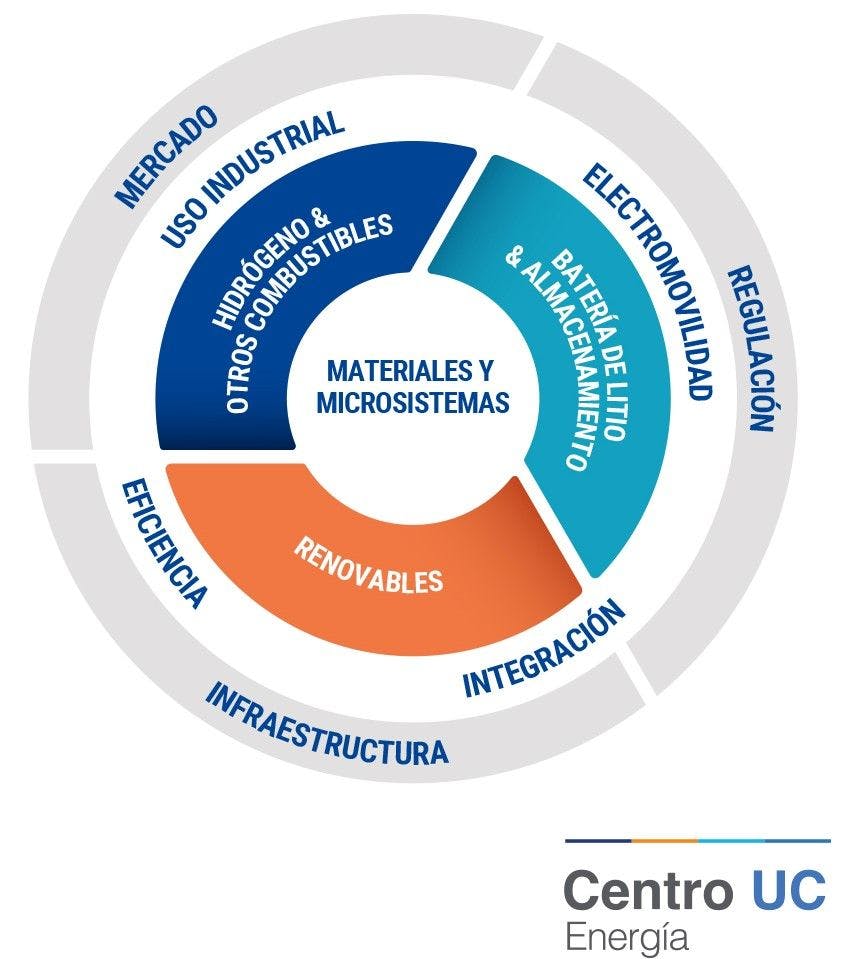Roberto Santiago
Mi nombre es Roberto Santiago, y como estudiante del Doctorado en Ingeniería y Ciencias con la Industria (DICI) de la Pontificia Universidad Católica de Chile, quiero compartir mi experiencia con el Centro de Energía UC y cómo esta vinculación ha potenciado significativamente mi formación académica y profesional.
He tenido la oportunidad de participar como oyente en las numerosas conferencias y seminarios organizados por el Centro. Estos eventos han abordado temáticas de vanguardia en el sector energético, contando siempre con la participación de destacados investigadores y autoridades tanto nacionales como internacionales. Esta exposición constante a las últimas tendencias y desarrollos ha sido fundamental para ampliar mi visión sobre los desafíos y oportunidades que presenta la transición energética global y definir mi línea de investigación doctoral.
Lo que hace especialmente valioso al Centro de Energía UC es su enfoque integral y multidisciplinario, estructurado en ejes estratégicos que abarcan todo el ecosistema energético: desde hidrógeno y nuevos combustibles, electrónica de potencia, almacenamiento de energía, energías renovables, hasta aspectos de mercado, regulación, infraestructura, eficiencia e integración. Esta visión holística permite a los estudiantes conectarse con diferentes dimensiones del sector energético según sus intereses particulares.
Visita a proyecto H2 de FLOENE en Setúbal junto a colegas del IPS.
En línea con los ejes de investigación del Centro, a través del programa ENERGYTRAN, realicé una visita de dos semanas a Portugal donde pude conocer de primera fuente junto a colegas del Instituto Politécnico de Setúbal (IPS) y del Laboratorio Nacional de Energía y Geología (LNEG), el despliegue de su estrategia nacional del hidrogeno. Tuve acceso a proyectos innovadores que están siendo desarrollados en toda la cadena de valor y pude conocer por dentro instituciones como HyLab y Hychem con interesantes portafolios de proyectos I+D.
Esta experiencia internacional no solo me permitió conocer y profundizar aspectos técnicos específicos relacionados al hidrógeno y combustibles alternativos, sino que también me permitió establecer una red de contactos con colegas que actualmente están trabajando en temas relacionados con la transición energética, energías renovables, electromovilidad e hidrógeno verde. Estas conexiones sumamente valiosas para mi desarrollo profesional establecen el punto de inicio para futuras colaboraciones en investigación.
Si eres estudiante de postgrado y estás interesado en el sector energético, te invito a acercarte al Centro de Energía UC. Con sus múltiples líneas de investigación interconectadas, las oportunidades que ofrece van mucho más allá tú formación académica, sino que te posiciona a la vanguardia de la investigación aplicada y te prepara para enfrentar los desafíos energéticos del futuro con herramientas concretas y una red de expertos global para ser parte activa de la transformación energética que nuestro país y el mundo necesitan.

My name is Roberto Santiago, and as a student of the Doctorate in Engineering and Science with Industry (DICI) of the Pontificia Universidad Católica de Chile, I want to share my experience with the UC Energy Center and how this link has significantly enhanced my academic and professional training.
I have had the opportunity to participate as a listener in numerous conferences and seminars organized by the Center. These events have addressed cutting-edge issues in the energy sector, always with the participation of leading researchers and national and international authorities. This constant exposure to the latest trends and developments has been instrumental in broadening my vision of the challenges and opportunities presented by the global energy transition and in defining my doctoral line of research.
What makes the UC Energy Center particularly valuable is its comprehensive and multidisciplinary approach, structured in strategic axes that cover the entire energy ecosystem: from hydrogen and new fuels, power electronics, energy storage, renewable energies, to aspects of market, regulation, infrastructure, efficiency and integration. This holistic vision allows students to connect with different dimensions of the energy sector according to their particular interests.
Visit to FLOENE's H2 project in Setúbal with IPS colleagues.
In line with the Center's research axes, through the ENERGYTRAN program, I made a two-week visit to Portugal where I was able to learn first-hand, together with colleagues from the Polytechnic Institute of Setúbal (IPS) and the National Laboratory of Energy and Geology (LNEG), about the deployment of its national hydrogen strategy. I had access to innovative projects that are being developed throughout the value chain and I was able to get an inside look at institutions such as HyLab and Hychem with interesting R&D project portfolios.
This international experience not only allowed me to learn and deepen specific technical aspects related to hydrogen and alternative fuels, but also allowed me to establish a network of contacts with colleagues who are currently working on issues related to energy transition, renewable energy, electromobility and green hydrogen. These extremely valuable connections for my professional development set the starting point for future research collaborations.
If you are a graduate student and you are interested in the energy sector, I invite you to approach the UC Energy Center. With its multiple interconnected lines of research, the opportunities it offers go far beyond your academic training, but positions you at the forefront of applied research and prepares you to face the energy challenges of the future with concrete tools and a global network of experts to be an active part of the energy transformation that our country and the world need.
